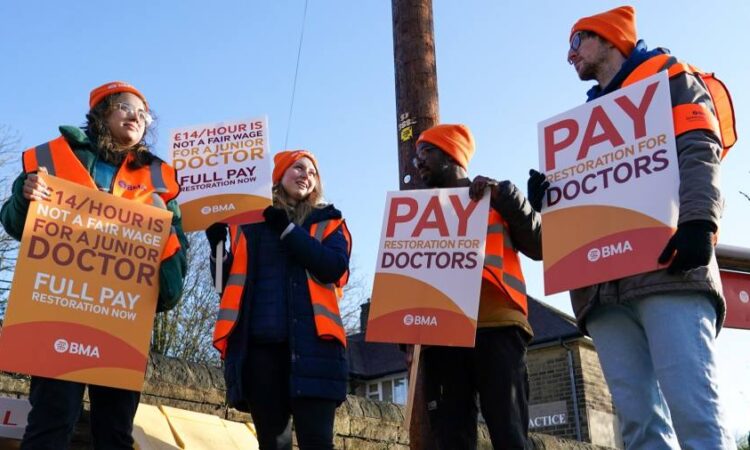
The British Medical Association has formally asked ministers to enter talks brokered by the arbitration service Acas to end a dispute over junior doctors’ pay in England that is straining health services already disrupted by months of industrial action.
The UK’s biggest doctors’ union said on Wednesday it was willing to negotiate over its demands for a 35 per cent pay rise. Earlier in the day, prime minister Rishi Sunak said he wanted to find a “reasonable compromise” to end the dispute.
Doctors below consultant grade walked out across England for the second day in a 96-hour strike, as the deadlock over pay and working conditions continued. The BMA has claimed junior doctors’ pay has fallen by 26 per cent in real terms — using the RPI measure of inflation — since 2008-9.
The walkout is the second strike by junior doctors and follows recent industrial action by other health workers that has left the NHS struggling to deal with record waiting lists. Ministers have made an improved pay offer to nurses and other NHS staff, which union members are voting on.
At the beginning of the junior doctors’ dispute, the BMA called for full pay restoration, which by its calculations would mean an increase of about 35 per cent. Health secretary Steve Barclay has refused to negotiate from that starting point, calling it “unreasonable”, implying the government would enter talks only if the BMA lowered its pay demands.
Professor Philip Banfield, chair of council at the BMA, said that “restoring junior doctors’ pay should not be an unworkable proposition for talks” but also suggested that there could be some flexibility on the scale and timing of any increase.
The 35 per cent figure was “not at all unreasonable”, he told Times Radio, and added that the union needed “to be in the room to discuss . . . what it means for different doctors across what kind of different timescale”.
The BMA said it was “ready to consider any offer the health secretary tables” and could suspend strike action in response to a “credible” offer that showed the government was “serious about beginning to address the real-terms pay erosion junior doctors have faced”.
The BMA said it wanted Acas, a public body that offers arbitration and conciliation services, to help broker talks with ministers, and called on Barclay to “make himself available and open” to this.
Acas played a similar role in creating a framework to settle a dispute between the government and the BMA over junior doctors’ pay in 2016.
More recently, Acas has hosted talks between Royal Mail and the CWU union in their long-running pay dispute, although the latest negotiations ended without agreement.
“We believe that working with Acas provides the most realistic chance of a successful outcome,” Banfield said, arguing that the arbitration service could in the first instance help the two sides agree “the terms and conditions of engagement to initiate talks”.
Meanwhile, Sunak has said that the government is focused on securing the “right outcome for patients and taxpayers”. He added: “We are happy to talk about pay settlements that are reasonable, that are fair, that are affordable for the taxpayer and allow us to continue delivering on our promise to halve inflation.”
The prime minister also argued that the government had a “track record” in getting round the table and compromising with unions, pointing to the current pay offer being deliberated by other health unions such as the Royal College of Nursing.
The government said it had been engaging with Acas during the dispute and remained open to considering whether there was a role for them.
A health department spokesperson said Barclay “has been clear his door is open and he remains willing to engage constructively — but that a demand of 35 per cent, which would involve some junior doctors receiving a £20,000 pay rise, is unreasonable in the current economic context”.






